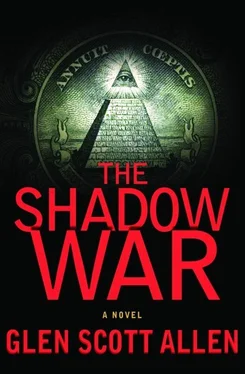Glen Allen - The shadow war
Здесь есть возможность читать онлайн «Glen Allen - The shadow war» весь текст электронной книги совершенно бесплатно (целиком полную версию без сокращений). В некоторых случаях можно слушать аудио, скачать через торрент в формате fb2 и присутствует краткое содержание. Жанр: Триллер, на английском языке. Описание произведения, (предисловие) а так же отзывы посетителей доступны на портале библиотеки ЛибКат.
- Название:The shadow war
- Автор:
- Жанр:
- Год:неизвестен
- ISBN:нет данных
- Рейтинг книги:5 / 5. Голосов: 1
-
Избранное:Добавить в избранное
- Отзывы:
-
Ваша оценка:
- 100
- 1
- 2
- 3
- 4
- 5
The shadow war: краткое содержание, описание и аннотация
Предлагаем к чтению аннотацию, описание, краткое содержание или предисловие (зависит от того, что написал сам автор книги «The shadow war»). Если вы не нашли необходимую информацию о книге — напишите в комментариях, мы постараемся отыскать её.
The shadow war — читать онлайн бесплатно полную книгу (весь текст) целиком
Ниже представлен текст книги, разбитый по страницам. Система сохранения места последней прочитанной страницы, позволяет с удобством читать онлайн бесплатно книгу «The shadow war», без необходимости каждый раз заново искать на чём Вы остановились. Поставьте закладку, и сможете в любой момент перейти на страницу, на которой закончили чтение.
Интервал:
Закладка:
I pressed hard for the whole sum demanded, but was told it was impossible.
Our people certainly ought to do more for themselves. It is absurd the pretending to be lovers of liberty while they grudge paying for the defence of it.
But those "Triangulists" of the recent Newburgh intrigue do no good for our reputation abroad. Any knowledge of such things could hurt our credit and the loan in Holland, to say nothing of sullying our reputation as a true Democracy, and would prevent our getting any thing here but from government.
I hope your disassociation from those rogues is immediate and compleat.
I am amp; c.
(Signed) B. Franklin.
Benjamin leaned back, then read it again to make certain he'd seen what he thought he'd seen.
There it was: Franklin chastising Robert Morris for his "Triangulist" allies and suggesting that any whisper of the Newburgh conspiracy in the corridors of power in France or Holland, the two major financial supporters of the nascent United States, could irreparably harm his efforts to obtain loans.
He remembered now: he'd read through these letters when he was doing his research on Franklin's pyramid code. He'd seen that reference to the Newburgh conspiracy-but that time news of the aborted coup had reached Franklin in France-as well as the mention of "Triangulists" among the Colonial government.
But at the time he'd interpreted the word "Triangulists" as all Colonial scholars had throughout history: as a sarcastic slap at those in the Congress who'd been less than enthusiastic about formalizing true democracy-full and popular representation in the Constitution-and instead seemed to be maneuvering for a form of government somewhere between democracy and a parliamentary monarchy, as in England. Triangulists, it was thought, were those hedging their bets, people who had either begun the Revolutionary War as outright Tory sympathizers, like Gouverneur Morris's parents, or spent it agitating for appeasement with the British. The delegates so referred to, it was assumed, were the American version of aristocrats. People like Gouverneur Morris and Alexander Hamilton, for instance. And people like General Horatio Lloyd Gates.
He replaced the book where he had found it, then exited the Special Collections room and went to the elevator.
It was while he was waiting for the elevator that he noticed a man who was standing near the railing, apparently taking in the compelling architecture of the library. But something struck him as odd about this would-be tourist. Then he saw it: he was wearing an earpiece cell phone. And such equipment didn't work in the library. Or at least it wasn't supposed to.
When the elevator door opened, Benjamin stepped in and pushed the button for the basement. He saw the man start toward the elevator. Benjamin pressed his ID badge against an electronic scanner on the elevator control panel, then quickly pressed the Close Door button. The doors eased shut just as the man-someone with dark glasses and very close-cropped brown hair-reached the doors. Benjamin saw the look of frustration on his face.
Once the doors had closed, Benjamin took off the hat and leaned back against the brass railing, unsure what to do next. He really hadn't thought about being followed, assuming that, if the Foundation knew where he was, they would simply report him to the authorities. He had to think quickly.
Too soon the doors opened in the library's basement. He looked around. He thought of pressing the emergency or fire alarm button to lock out the elevator, but that would require them to clear out the whole building. And, while he knew places he could hide, they might simply close the library for the afternoon, and then he'd have a tough time explaining himself when he tried to exit and found the place crawling with D.C. police and firemen. Then he thought of another plan.
He went to his old office. He looked for an unoccupied cubicle, used the phone to dial security. He identified himself, and then said he'd seen "someone strange" lurking about on the second floor with an earpiece cell phone. Maybe he had a cell phone camera as well? Those weren't allowed in the library, were they? He didn't want to be a bother, but… He was told someone would check it out immediately.
He hung up. Even if security didn't find the guy, still he thought the appearance of several security personnel, all clearly looking for someone, would either delay his pursuer, or perhaps discourage him completely, and he'd wait outside, to pick Benjamin up when he exited the library.
But he had another plan to deal with that eventuality.
Benjamin left the office and walked down the hall to the preservation storage area. There was indeed someone on duty inside, an employee named Larry that Benjamin knew slightly.
"Benjamin!" Larry greeted him-a little too loudly for his comfort. "Back from that think tank already?"
"Sort of," Benjamin hedged. "They needed me to check on something in the storage room, see if it's still here."
"And they sent you all the way down here to do that? Why not just call?"
"Hey," Benjamin shrugged, "it's their dime, right?"
Larry laughed, patted him on the back. "Yeah, wish it was my dime, ya know?"
He unlocked the room, switched on the dull blue lights overhead.
"You know the drill," Larry said. "Knock when you're done."
Benjamin nodded, thanked him, and Larry closed and locked the door from the outside.
And it suddenly occurred to Benjamin: if they had wanted to trap him here, they'd just done it.
The room was essentially a large warren of shelves, the shelves composed of bins, and the bins labeled according to subject, date, and, in some cases, donor. Benjamin thought back: the bin he'd been working on when he'd encountered the diary had contained case history files from some of New England's more infamous asylums for the insane from the Colonial and nineteenth-century millennial period.
But first he went to a small podium set near the door, opened a cabinet, and took out a pair of latex gloves from a box that was always kept there. Many of the documents in this room-where the humidity and temperature were carefully controlled-were sensitive to even the small amounts of acid in human sweat.
Walking carefully past the bins, he tracked down the section devoted to medical records, and then worked backward to the period 1750-1820. Set very far back in the room, almost hidden in the cul-de-sac formed by three shelves, he found the original crate he'd been examining all those months before: documents donated by the American Medical Association. And then, right next to it, just as he remembered, was a smaller crate, with the name MORRIS, S.-1968 written by hand on a small index card and taped to the crate.
Benjamin pulled the crate very carefully forward on the shelf. He peered over the edge into the dim interior. He realized he'd been holding his breath for some minutes. The blue-tinted lights barely illuminated the contents. Regular lighting was too yellow for sensitive paper, and fluorescents were out of the question.
He pulled the crate a little farther forward-and suddenly its weight shifted, and the crate came tumbling toward him off of the shelf. He fell to the floor but managed to stop the crate from hitting his body. He stopped, listening, worried that the sound would bring Larry to see if everything was okay. But after a moment he realized the sound hadn't been nearly as loud as he feared.
He gently set the crate on the floor. He reached in, toward a large clear plastic container, one of the hermetically sealed bags used to contain specimens prior to restoration. There was no identifying information, which was unusual. Inside the bag was what appeared to be shapeless brown wrapping of some kind. Leather-so old it was almost as stiff as cardboard.
Читать дальшеИнтервал:
Закладка:
Похожие книги на «The shadow war»
Представляем Вашему вниманию похожие книги на «The shadow war» списком для выбора. Мы отобрали схожую по названию и смыслу литературу в надежде предоставить читателям больше вариантов отыскать новые, интересные, ещё непрочитанные произведения.
Обсуждение, отзывы о книге «The shadow war» и просто собственные мнения читателей. Оставьте ваши комментарии, напишите, что Вы думаете о произведении, его смысле или главных героях. Укажите что конкретно понравилось, а что нет, и почему Вы так считаете.












